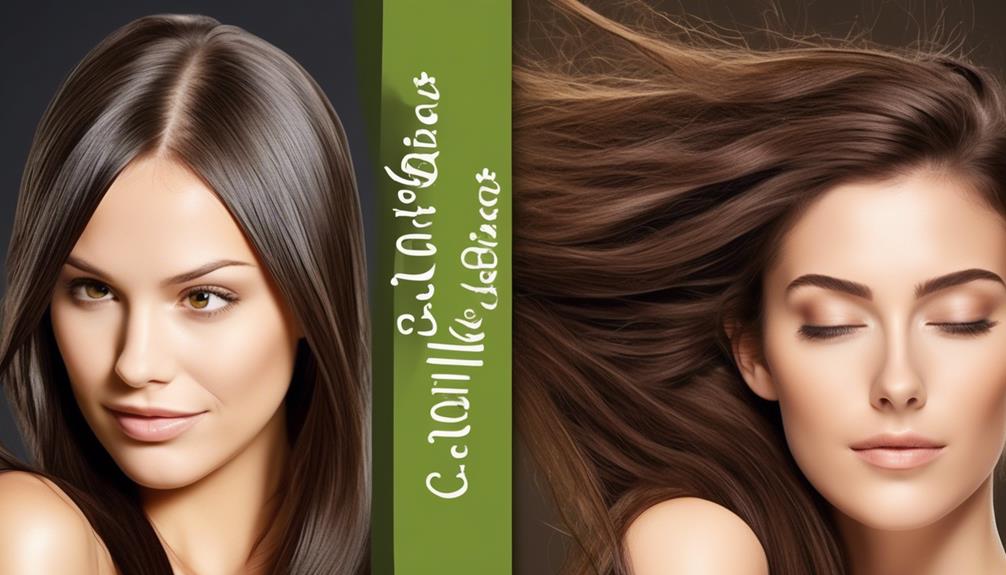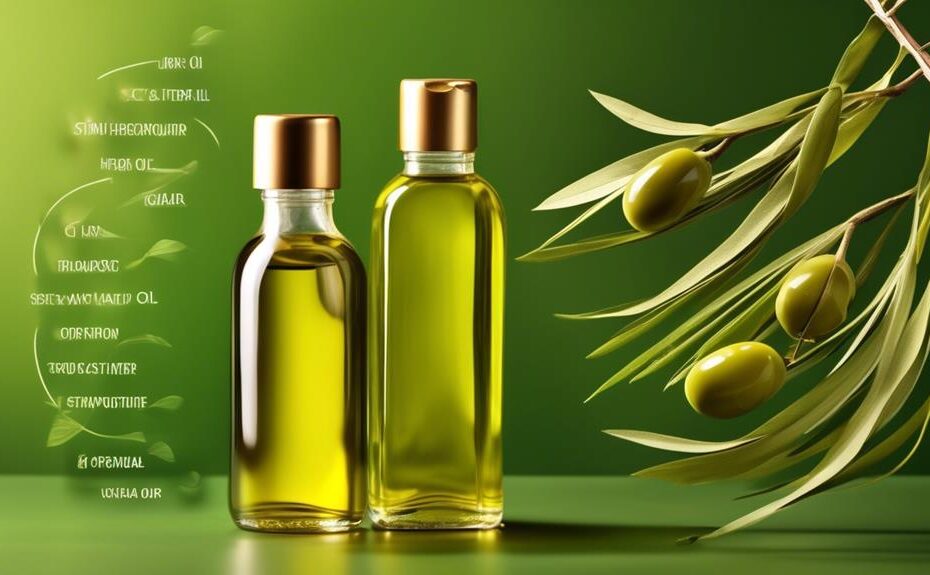When it comes to nourishing your hair, deciding between castor oil and olive oil can be quite a puzzle. Both oils offer unique benefits and properties that can contribute to the overall health of your hair.
Castor oil, known for its thick consistency, is often praised for its ability to promote hair growth and increase thickness.
On the other hand, olive oil, with its lightweight texture, is renowned for its moisturizing and hydrating properties.
So, which oil should you choose? Let’s delve into the mysteries surrounding these oils and determine which option is best suited for your hair needs.
Key Takeaways
- Castor oil promotes hair growth and increases hair density
- Olive oil nourishes and strengthens the hair, leading to healthier strands
- Castor oil provides deep moisturization, while olive oil has conditioning properties
- Castor oil may cause irritation or allergic reactions, while allergies to olive oil are relatively rare
Benefits of Castor Oil for Hair

Using castor oil for your hair can provide numerous benefits, making it a popular choice among those seeking to improve the health and appearance of their locks.
One of the key benefits of castor oil is its ability to promote hair growth. Castor oil contains a high concentration of ricinoleic acid, which has been shown to stimulate hair follicles and increase blood circulation to the scalp. This increased blood flow delivers essential nutrients and oxygen to the hair follicles, promoting healthier and stronger hair growth.
Additionally, castor oil has moisturizing properties that can help prevent dryness and breakage. It coats the hair shaft, sealing in moisture and preventing the loss of hydration, resulting in improved hair elasticity and reduced frizz. Castor oil also contains omega-6 fatty acids, which nourish the hair and scalp, promoting overall hair health.
Furthermore, castor oil has antimicrobial properties that can help prevent scalp infections and dandruff. It can reduce inflammation and soothe an irritated scalp, creating an optimal environment for healthy hair growth.
To enjoy the benefits of castor oil for your hair, you can apply it directly to your scalp and hair, massaging it in gently. Leave it on for a few hours or overnight for maximum absorption before washing it out. Regular use of castor oil can lead to thicker, longer, and healthier hair.
Benefits of Olive Oil for Hair
Olive oil offers numerous benefits for your hair.
Firstly, it nourishes the hair strands, providing them with essential vitamins and minerals that promote overall hair health.
Secondly, it helps to prevent hair breakage by moisturizing and strengthening the hair shaft, reducing the risk of split ends and damage.
Lastly, olive oil has been shown to promote hair growth by stimulating the hair follicles and improving blood circulation to the scalp.
Incorporating olive oil into your hair care routine can lead to stronger, healthier, and longer hair.
Nourishing Hair Strands
To nourish your hair strands and keep them healthy, incorporating the benefits of olive oil into your hair care routine can make a significant difference.
Olive oil has been used for centuries as a natural remedy for various hair concerns. Its rich composition of antioxidants, vitamins, and fatty acids makes it an excellent choice for nourishing and strengthening your hair.
When applied to the hair strands, olive oil helps to moisturize and seal in moisture, preventing dryness and brittleness. It also enhances the elasticity of the hair, reducing breakage and split ends.
Additionally, olive oil has anti-inflammatory properties that can soothe the scalp and promote a healthy environment for hair growth.
Preventing Hair Breakage
Incorporating the nourishing benefits of olive oil into your hair care routine can significantly reduce hair breakage and promote stronger, healthier strands. Olive oil is packed with antioxidants and essential fatty acids that nourish the hair shaft, improving its elasticity and preventing breakage.
Here are five reasons why olive oil is beneficial for preventing hair breakage:
- Deep hydration: Olive oil penetrates the hair shaft, providing deep hydration and preventing dryness, which can lead to breakage.
- Sealing in moisture: By sealing in moisture, olive oil helps to protect the hair from environmental damage and reduces the risk of breakage.
- Strengthening the hair shaft: The nutrients in olive oil help to strengthen the hair shaft, making it more resistant to breakage and damage.
- Reducing split ends: Olive oil smooths the hair cuticles, reducing split ends and preventing further breakage.
- Improving hair elasticity: The fatty acids in olive oil improve the elasticity of the hair, making it more flexible and less prone to breakage.
Promoting Hair Growth
For those looking to promote hair growth, using olive oil in your hair care routine can provide numerous benefits.
Olive oil is rich in antioxidants and essential fatty acids, which can nourish and strengthen the hair follicles, preventing hair loss and promoting new hair growth.
The antioxidants present in olive oil help to neutralize the free radicals that can damage the scalp and hair follicles, improving scalp health and creating a favorable environment for hair growth.
Additionally, olive oil has moisturizing properties that can help to hydrate the scalp and prevent dryness, which is often a leading cause of hair loss and breakage.
Regularly massaging olive oil into your scalp and hair can stimulate blood flow and promote healthy hair growth.
Differences in Nutritional Composition
Castor oil and olive oil have distinct differences in their nutritional composition, which can greatly impact their effectiveness for hair care. Understanding these differences can help you make an informed decision about which oil is best for your hair health needs.
Here is a comparison of the nutrients found in castor oil and olive oil:
- Castor oil is rich in fatty acids, particularly ricinoleic acid, which has been linked to hair growth stimulation. It also contains vitamin E, proteins, and minerals like magnesium and zinc, all of which contribute to healthier hair.
- Olive oil, on the other hand, is packed with monounsaturated fats, such as oleic acid, which helps moisturize and nourish the hair. It also contains vitamin E, which acts as an antioxidant and protects the hair from damage caused by free radicals.
- Castor oil has a denser consistency than olive oil, making it more suitable for thick or coarse hair that requires deep hydration and conditioning.
- Olive oil is lighter and more easily absorbed by the hair, making it a great option for those with fine or oily hair who still want to enjoy the benefits of an oil treatment.
- Both oils have antibacterial and antifungal properties, which can help combat dandruff and scalp infections, promoting overall scalp health.
Impact on Hair Growth and Thickness

When it comes to hair growth, castor oil has been shown to be more effective than olive oil. This is because castor oil contains a high concentration of ricinoleic acid, which has been found to stimulate hair follicles and promote hair growth. In contrast, olive oil doesn’t have the same level of ricinoleic acid and may not have the same impact on hair growth.
Similarly, when it comes to thickness, castor oil can help to nourish the hair follicles and make the hair appear thicker and fuller, while olive oil may not have the same effect.
Growth: Castor Vs Olive
To understand the impact of castor oil and olive oil on hair growth and thickness, it’s essential to delve into their unique properties and how they interact with your hair follicles. Both oils offer benefits for hair growth, but they differ in their mechanisms and effectiveness.
Here’s a comparison of the growth-promoting properties of castor oil and olive oil:
- Castor oil benefits:
- Contains ricinoleic acid, which stimulates blood circulation to the scalp and promotes hair growth.
- Rich in omega-6 fatty acids, vitamin E, and proteins, which nourish the hair follicles and promote healthy growth.
- Has antimicrobial properties that can help prevent scalp infections that may hinder hair growth.
- Olive oil benefits:
- Contains antioxidants that protect the scalp and hair from damage caused by free radicals.
- Rich in vitamin E and healthy fats, which nourish the hair strands and promote overall hair health.
While both oils have benefits for hair growth, castor oil’s ricinoleic acid and antimicrobial properties make it a more potent option. However, olive oil can still contribute to hair growth by providing essential nutrients and protecting the hair from damage.
Thickness: Castor Vs Olive
Comparing the impact on hair growth and thickness, it’s important to consider the properties and effects of castor oil and olive oil.
When it comes to hair thickness, both oils have their own unique qualities. Castor oil is known for its thick consistency, which can help coat the hair strands and provide a volumizing effect. It contains ricinoleic acid, which has been shown to stimulate hair growth and increase hair density.
On the other hand, olive oil is lighter in texture and may not provide the same level of thickness as castor oil. However, it’s rich in antioxidants and fatty acids, which can nourish and strengthen the hair, leading to healthier and more resilient strands.
Ultimately, the choice between castor oil and olive oil for hair thickness depends on your personal preference and hair type.
Moisturizing and Hydrating Properties
Castor oil and olive oil have distinct moisturizing and hydrating properties that can significantly benefit your hair. Understanding the differences between these two oils can help you choose the one that suits your hair type and needs best.
Here are the key points to consider:
- Moisturizing vs. conditioning properties: Castor oil is known for its deep moisturizing properties. It penetrates the hair shaft, providing intense hydration and preventing dryness. On the other hand, olive oil has conditioning properties that help to soften and smooth the hair, making it more manageable.
- Effectiveness for dry hair vs. oily hair: If you have dry hair, castor oil may be a great choice for you. Its thick consistency and high moisture content can help replenish lost moisture and improve the overall health of your hair. However, if you have oily hair, olive oil might be a better option. Its lighter texture can moisturize without weighing down your hair or making it greasy.
- Scalp health: Castor oil has antibacterial and antifungal properties that can promote a healthy scalp by reducing dandruff and preventing infections. Olive oil, on the other hand, helps to soothe an irritated scalp and reduce inflammation.
- Nutrient content: Castor oil is rich in essential fatty acids, vitamin E, and proteins, which nourish and strengthen the hair. Olive oil is packed with antioxidants, vitamins A and E, and omega-3 fatty acids, which help to protect the hair from damage and promote healthy growth.
- Compatibility with other products: Both oils can be used as carrier oils for essential oils and other hair care products. However, due to its thicker consistency, castor oil may require dilution with a lighter oil or water for easier application.
Potential Side Effects and Allergies

Moving on to the potential side effects and allergies, it’s crucial to understand how castor oil and olive oil may affect your hair and scalp. While both oils are generally safe for use, it’s important to be aware of any potential side effects that may occur.
Castor oil is known to have a few potential side effects. Some individuals may experience irritation or an allergic reaction when applying castor oil to the scalp. This can manifest as redness, itching, or a rash. Additionally, castor oil is a thick and heavy oil, which may cause greasiness and weigh down the hair if not properly rinsed out. It’s advisable to perform a patch test before using castor oil to check for any allergic reactions.
On the other hand, olive oil is generally well-tolerated by most individuals. However, some people may have an allergic reaction to olive oil. Symptoms of an allergic reaction can include itching, redness, and swelling of the scalp. It’s important to note that allergies to olive oil are relatively rare.
How to Incorporate Castor Oil or Olive Oil Into Your Hair Care Routine
To effectively incorporate either castor oil or olive oil into your hair care routine, it’s important to consider their unique properties and benefits. Both oils can be beneficial for various hair types, but understanding their specific advantages can help you make the best choice for your hair.
Here are some tips on how to incorporate castor oil or olive oil into your hair care routine:
- Determine your hair type: Castor oil is thicker and heavier, making it more suitable for thick and coarse hair. Olive oil, on the other hand, is lighter and can be used on all hair types.
- Pre-shampoo treatment: Apply a small amount of castor oil or olive oil to your hair and scalp before shampooing to moisturize and nourish your hair.
- Deep conditioning: Mix castor oil or olive oil with your favorite deep conditioner and apply it to your hair. Leave it on for 30 minutes to an hour before rinsing for added moisture and softness.
- Styling and heat protection: Apply a small amount of either oil to your hair before using heat styling tools to protect your hair from damage and add shine.
- Overnight treatment: For an intensive treatment, apply castor oil or olive oil to your hair before bed and leave it on overnight. Rinse it out in the morning for soft and manageable hair.
Incorporating castor oil or olive oil into your hair care routine can provide numerous benefits, from moisturizing and nourishing your hair to protecting it from heat damage. Experiment with different methods to find what works best for your hair type and enjoy the benefits of these natural oils.
Conclusion
In conclusion, both castor oil and olive oil have their own unique benefits for hair.
Castor oil is known for its hair growth and thickness promoting properties.
Olive oil is praised for its moisturizing and hydrating effects.
The choice between the two ultimately depends on your specific hair needs and preferences.
Experiment with both oils to discover which one works best for you and enjoy the nourishing benefits they provide for your hair.
